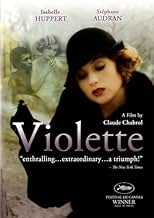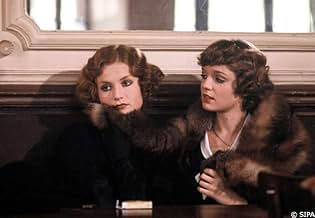In einem Zwischenkriegsfrankreich, das mit tiefgreifenden sozialen und politischen Veränderungen zu kämpfen hat, rebelliert die 18-jährige Violette Noziere gegen die Zwänge ihrer klaustropho... Alles lesenIn einem Zwischenkriegsfrankreich, das mit tiefgreifenden sozialen und politischen Veränderungen zu kämpfen hat, rebelliert die 18-jährige Violette Noziere gegen die Zwänge ihrer klaustrophobischen, arbeiterfreundlichen (und möglicherweise inzestuösen) Familie, mit beunruhigenden... Alles lesenIn einem Zwischenkriegsfrankreich, das mit tiefgreifenden sozialen und politischen Veränderungen zu kämpfen hat, rebelliert die 18-jährige Violette Noziere gegen die Zwänge ihrer klaustrophobischen, arbeiterfreundlichen (und möglicherweise inzestuösen) Familie, mit beunruhigenden Folgen.
- Auszeichnungen
- 2 Gewinne & 5 Nominierungen insgesamt
- Germaine Nozière
- (as Stephane Audran)
- Le musicien noir
- (as Grégory Germain)
Empfohlene Bewertungen
In the streets ,the buskers sang the horrible story of the infamous Violette Nozière.
The whole film revolves around the heroine played by Isabelle Huppert. The script is quite faithful to the story, presents the facts as reported by the press of the time and does not try to serve surprises or insert speculative interpretations about the reasons for the actions and the psychological sources of the acts committed by the young woman. The director's attention is focused on reconstructing the confined and devoid of personal separation in which the Noziere family lives, the bohemian environment in which the young high school girl spends her time in the company of students, crooks, and old bourgeois who take advantage of the youth of girls in need for money or sensations. Rejecting both moral judgments and psychoanalytic interpretations, Chabrol lets Isabelle Huppert build the role of the girl who, instead of teenage dreams, plunges into promiscuity, and who travels from adolescent rebellion to murder with an impassive coldness. We don't find too many reasons in the film that would put us as spectators in the camp of Violette's supporters, except for the personality of the actress who fills the role with gloomy feelings and self-destructive tension.
Isabelle Huppert achieves with the part of Violette in this film one of the first great roles of a fabulous career. She is supported by Stéphane Audran (the director's second wife, whom he would break up after 14 years of marriage and many remarkable films in the same year 1978) and Jean Carmet, one of those talented French actors whom Chabrol was giving the opportunity of consistent parts even if they were not first rank stars. A special award should be given to those who recognize Fabrice Luchini in one of the first roles of his film career. The style of the story is interesting and elaborate, temporally separated frames continue visually one another, flashbacks and imaginary scenes (especially from Violetta's fantasies or nightmares) are interleaved nervously and non-linearly, but perfectly following the logic of the action. 'Violette Noziere' manages to describe the interwar social environment, with social contradictions, moral prejudices, inequalities and stigmas related to the status of women and the pressure of the press of sensation. The film also intents to be a psychological study into the motives of the crime. Here, I think intentionally, the answer is not clear. We are shown the conditions that can generate crime, but not the gates that open between reality and horror. Judgments belong to us, the spectators.
"Violette Nozière" (1978) is the true story of a French psychopath in the 30's by Claude Chabrol. The plot is ambiguous in many moments, mostly regarding the accusation of incest. But the film induces the viewer that Violette is a cold-blood murderer, ambitious and in love with a pimp. Isabelle Huppert ii excellent, as usual, in her first work with Chabrol. My vote is seven.
Title (Brazil): "Violette"
This is is a good movie except one thing kept bothering me. Isabelle Huppert looks too old. The story is based on a real girl who poisoned her parents at the age of 18. I never saw Violette as a teen. In fact, Isabelle Huppert looks 30 in her hooker makeup. I couldn't figure out why a 30 year old is living with her parents and acting like a kid hiding her makeup. I wondered if it's matter of the era she's living in. It's an easy fix if the movie lay out her age in an obvious way. She could have a birthday party. It throws the whole dynamic of the story and the family into confusion. The story really requires a younger actress to play this role. Otherwise, I like the performances but the age difference is really problematic.
Incidentally, the film seems to have been made as part of a two-picture deal (along with BLOOD RELATIVES [1978]) between France and Canada. Anyway, it led 23-year old Isabelle Huppert (though the character she plays is actually only supposed to be either 14 or 18, depending on the sources!), an award winner at Cannes, towards acquiring the well-deserved status of her country's premiere actress she retains to this day.
Chabrol tackled melodrama only occasionally and seldom with success: on the one side, we can cite THE BREACH (1970) and the afore-mentioned STORY OF WOMEN (also with Huppert) and, among those that did not work out quite as well as had been anticipated, one can name – alongside the film under review – the somewhat unnecessary adaptation of MADAME BOVARY (1991; in which Huppert had the title role yet again). The problem here lies with the story itself (to escape her stifling petit bourgeois existence, a girl – whose promiscuity had already given her syphilis – poisons both her parents), which is simply not all that interesting and, stretched to slightly over two hours, the effect rings even more hollow!
Still, to redress the balance, the film is imbued with the director's customary exactitude of period detail (it is set in the 1930s) and characterization (even if the protagonist hardly arouses our sympathy throughout, especially when accusing her late father of incestuous conduct to justify her own actions!) – but also unusually featuring a handful of quirky interpolated flashbacks. The strong supporting cast includes such Chabrol fixtures as Stephane Audran (at 45, heading definitely towards middle-aged roles though here she is still able to express her sexuality), Jean Carmet (by far his largest role for this director), Mario David and Bernadette Lafont (appearing towards the end as Violette's cellmate), as well as Francois Maistre (a Luis Bunuel regular) and Fabrice Luchini.
Wusstest du schon
- WissenswertesReceived an HD restoration from the original negatives in 2018 by Eclair labs through the support of Arte France's Cinema Unit and René Chateau Video.
Top-Auswahl
- How long is Violette?Powered by Alexa
Details
- Erscheinungsdatum
- Herkunftsländer
- Sprache
- Auch bekannt als
- Violette
- Drehorte
- Rue Santos-Dumont, Paris 15, Paris, Frankreich(Violette and Jean in the street, making plans)
- Produktionsfirmen
- Weitere beteiligte Unternehmen bei IMDbPro anzeigen
Box Office
- Budget
- 1.360.000 CA$ (geschätzt)
Zu dieser Seite beitragen



































